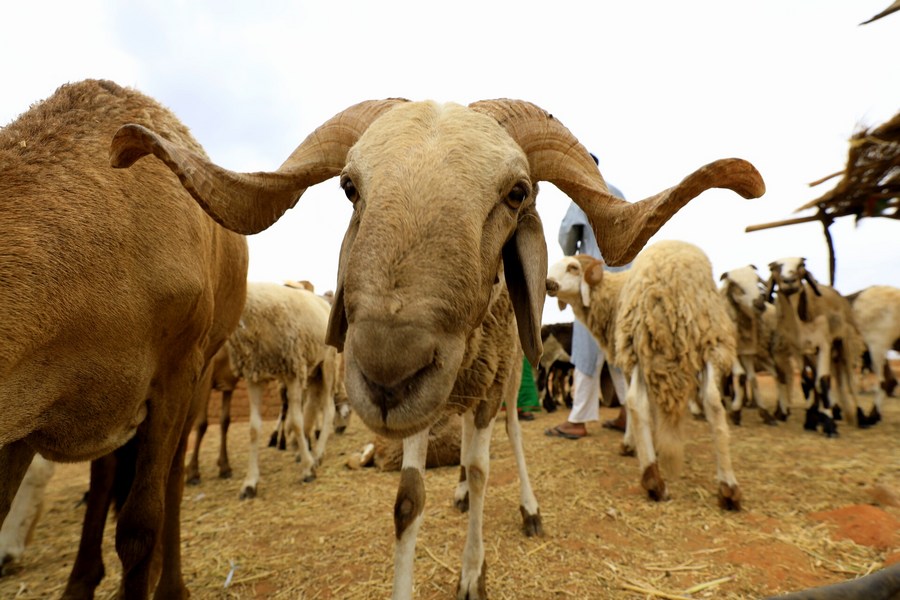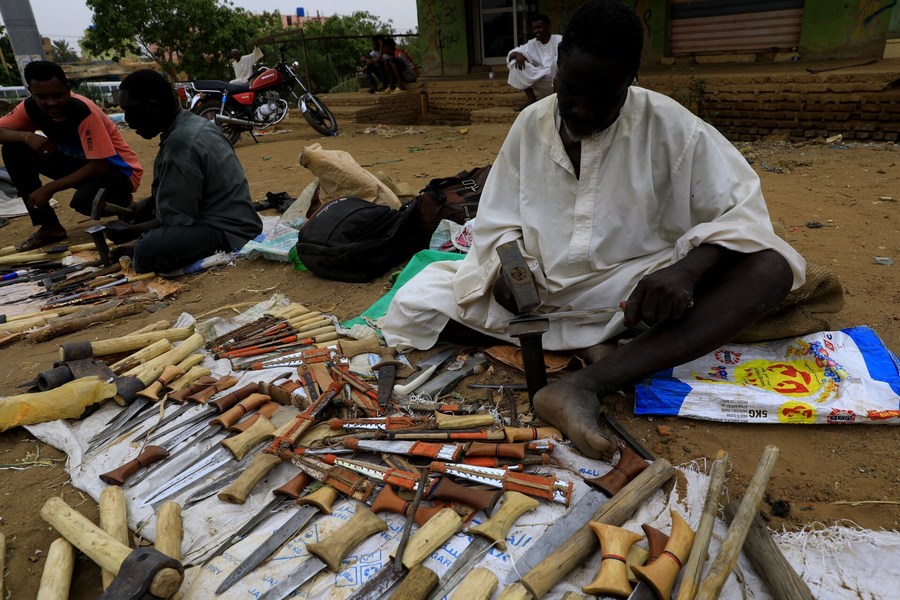
A sheep is seen on the photo taken in Khartoum, Sudan on July 18, 2021. (Xinhua/Mohamed Khidir)
Prices of livestock increase a lot in Sudan's capital ahead of the upcoming Eid al-Adha.
KHARTOUM, July 19 (Xinhua) -- Ahead of the Eid al-Adha, the Islamic Festival of the Sacrifice, customers are rarely seen in the livestock markets in the Sudan's capital Khartoum due to the weak demand for the sacrifice sheep and the high prices, according to traders and importers.

Blacksmiths wait near sheep sellers to sharpen knives in Khartoum, Sudan on July 18, 2021. (Xinhua/Mohamed Khidir)
On Sunday, the price of sacrifice sheep in the market in Khartoum recorded a significant hike of nearly 200 percent compared to last year.
"The prices range between 45,000 and 90,000 Sudanese pounds, equalling between about 100 and 200 U.S. dollars," Fadllalla Hamid, a Sudanese livestock trader at the livestock market south of Khartoum, told Xinhua.
"The markets have few customers due to the weak purchasing power, especially among employees, professionals and people with limited income," he noted.
Abdul-Jalil Haj Ali, a Sudanese citizen, told Xinhua that "this year I could not buy one sacrifice sheep because of the high prices."
"Unfortunately, the sheep's price is higher than my salary and the majority of the employees will not be able to purchase the sacrifice sheep," he added.
Meanwhile, Al-Khair Saleh who imports livestock from western Sudan to the Khartoum markets told Xinhua that "the high transportation costs, the high fodder prices, and the multiple fees imposed by the state" are the reasons for the high prices.
According to official statistics, Sudan had more than 107 million head of cattle in 2021 and exported more than one million head to Saudi Arabia worth 1,400 Saudi Riyals (373 U.S. dollars) per head.
Mohamed Yousif, director of the general directorate of quarantines and meat hygiene at Sudan's Animal Resources Ministry, attributed the hike in the sheep prices to the "presence of middlemen and brokers" who take advantage of the Eid al-Adha season to raise the prices beyond the real cost.
"There are efforts to address the phenomenon of the middlemen and brokers, including selling the sheep by weight," Yousif told Xinhua.
He further stressed that the livestock exports do not affect the local market as there is no connection in between.
The transitional government of Sudan is making economic reforms in agreement with the International Monetary Fund, the donor countries and the international financing institutions.
On July 15, representatives of Paris Club creditors agreed with the Sudanese government to restructure its external debts after Khartoum implemented a package of economic reforms that enabled Sudan in late June to reach the "decision point" in the Heavily Indebted Poor Countries (HIPC) Initiative.
According to the move, Sudan has received relief from its 14.1-billion-U.S. dollars' debts to Paris Club.
In the meantime, Sudan's Central Bureau of Statics on Sunday said the country's inflation jumped to 412.75 percent in June compared to 378.79 percent in May. ■




